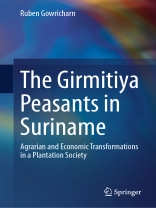This book examines the Indo-Surinamese Girmitiya peasants and their contributions to developing the ethnic community within their newly adopted home. It demonstrates the transformation of the Girmitiyas from agriculturalists in British India to plantation labourers to peasants and finally to urban dwellers.
The author argues that it was the Girmitiya peasants who had made greater contributions to developing the ethnic community over the labourers of whom about one-third returned to British India. The work covers the history of how the peasants institutionalised their practice, changed the physical landscape and integrated economically and politically as an ethnic group in their newly adopted homeland. Furthermore, the author presents arguments to demonstrate that Girmitiya peasants survived the plantation labour and peasant life due to their knowledge and skills of agrarian cultivation, known as agrarian human capital. The scholarly literature about the labour migration from British India has focused heavily on the fate of the labourers. Consequently, the history of the Girmitiya peasants as well as the cultural heritage they have produced has been grossly neglected. This book purports to fill this void by telling the history of Girmitiya peasants in Suriname, a Caribbean society adjacent to former British Guyana.
Inhoudsopgave
Chapter 1. Peasants in Girmitiya scholarship.- Part I: From rural dweller to plantation labourer.- Chapter 2. Migration and agrarian human capital.- Chapter 3. Labourers on the plantations.- Chapter 4. An embryonic ethnic community.- Part II: From labourer to peasant.- Chapter 5. The rise of rice peasants.- Chapter 6. Homemaking in Suriname.- Chapter 7. Ruralisation policy.- Part III: From peasant to urban dweller.- Chapter 8. The mechanisation of rice farming.- Chapter 9. Ethnic and economic politics.- Chapter 10. The transition of rice farmers.- Conclusion: Transformations of the Girmitiya peasantry.
Over de auteur
Ruben Gowricharn is professor of Indian Diaspora Studies at the VU University of Amsterdam, the Netherlands. Along with three edited volumes about the Indian diaspora (all Routledge) and numerous scholarly articles, his recent books include Miskend Verleden. Hindostaanse boeren in Suriname 1880-1980 (2020), Multiple Homemaking. The Ethnic Condition in Indian Diaspora Societies (2021), De Goudsmid (2022) and Ongezien Ongehoord. Hindostanen in de Nederlandse koloniale geschiedenis (2023, co-authoredwith Jaswina Elahi). Since 2005, Gowricharn is also managing director of a doctoral program for adult migrant students in the Netherlands, geared at enlarging the capacity of communities and organizations.












